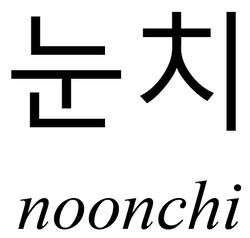In my latest column for Seoul Magazine’s January issue, I discuss issue of saying “no” in a Korean business setting. To go deeper into this topic, visit the links below:
- Crash Course on Korea Business Success Strategies (Lesson #7 discusses the issue of social invitations that may or may not be real invitations.)
- Topic Central Page on Korea Business Central: Korean Business Savvy
- Blog post: “The Korean Language is as Precise and Direct as English”
- Online article “LIFE IN KOREA: When a Job Offer is Something Else [EXPIRED LINK REMOVED: https://www.korea4expats.com/news-job-offer-korean-style]” (On Korea4Expats.com; an example of what happens when communications about ‘yes” and ‘no’ get all twisted up)
Here are a couple more insights I didn’t have room to include in the main article:
 The word “noonchi” comes in a variety of expressions, all of which include the meaning of understanding another person’s true intent. One who “doesn’t have noonchi” is someone without the ability to figure out that intent. To have “fast noonchi” means the opposite. “noonchi chaeda” is the process of figuring it out. This is one of a few words that doesn’t have a perfect translation into English and which is used very commonly in Korean communication about interpersonal relationships.
The word “noonchi” comes in a variety of expressions, all of which include the meaning of understanding another person’s true intent. One who “doesn’t have noonchi” is someone without the ability to figure out that intent. To have “fast noonchi” means the opposite. “noonchi chaeda” is the process of figuring it out. This is one of a few words that doesn’t have a perfect translation into English and which is used very commonly in Korean communication about interpersonal relationships.- It’s very easy to get linguistic, cultural and personal factors confused. As mentioned in the article, I don’t think linguistic factors mean much of anything when it comes to vagueness of communications, except insofar as a Korean’s lack of ability to express him/herself in English fluently may lead to misunderstandings. But what often happens is that non-Koreans mis-attribute cultural factors to personal shortcomings in the Koreans they deal with, and this is unfortunate. Sure, there are plenty of dishonest Koreans, but not as many as cultural misunderstandings might often imply.



